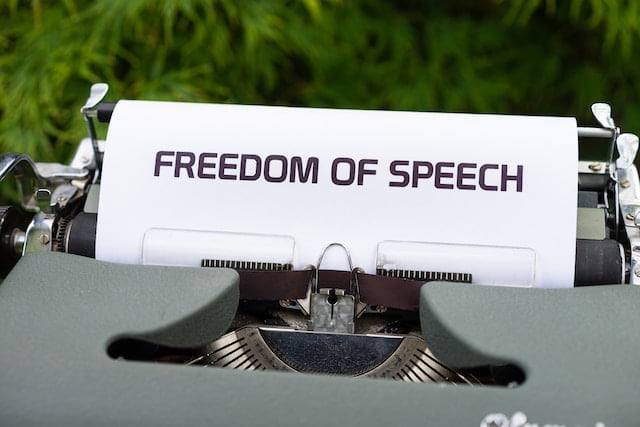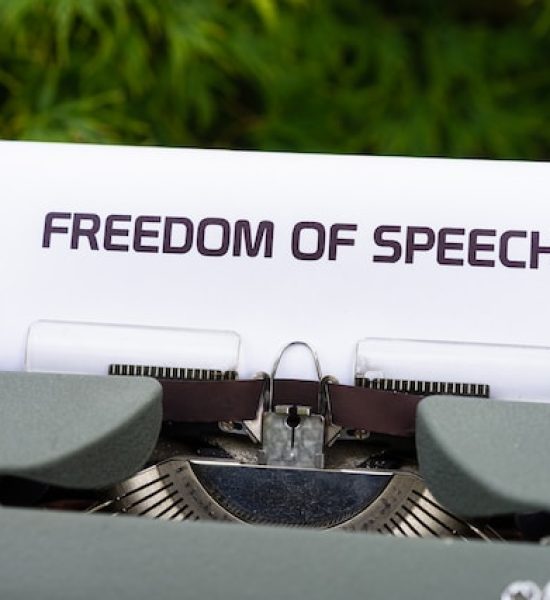Why freedom of speech is a necessity in a functional society
The concept of freedom of speech is often considered a fundamental principle in democracies and is protected by many legal systems and international agreements. Its importance in a functional society is widely debated, but many argue that it is indeed a necessity for several reasons:

- Promotion of Diversity and Pluralism: Freedom of speech allows for a variety of ideas, opinions, and perspectives to coexist. This diversity can lead to a more vibrant and innovative society by encouraging different viewpoints and approaches.
The promotion of diversity and pluralism is one of the key aspects associated with freedom of speech. Here’s a closer look at how freedom of speech contributes to the promotion of diversity and pluralism in society:
- Varied Perspectives: Freedom of speech allows individuals from different backgrounds, cultures, and belief systems to express their opinions and perspectives. This diversity of thought enriches public discourse and contributes to a more comprehensive understanding of complex issues.
- Cultural Exchange: Open dialogue enables the exchange of cultural ideas and values. People are free to share their cultural heritage, traditions, and customs, fostering a more inclusive and tolerant society.
- Innovation and Progress: When diverse ideas and perspectives are freely expressed, it can lead to innovation and progress. Different viewpoints may offer unique solutions to societal challenges and contribute to advancements in various fields.
- The challenge to Dominant Narratives: Freedom of speech allows individuals to challenge dominant narratives and question established norms. This helps prevent the suppression of alternative viewpoints and encourages a constant reevaluation of societal norms and values.
- Tolerance and Understanding: Exposure to diverse opinions can promote tolerance and understanding among people with differing viewpoints. It provides an opportunity for individuals to learn from one another and find common ground, fostering a sense of unity despite differences.
- Representation: Freedom of speech contributes to the representation of marginalized or underrepresented groups. It allows individuals from all walks of life to have a voice in public discourse, helping to address issues of inequality and promote social justice.
- Civic Engagement: In a society that values freedom of speech, people are more likely to actively participate in civic life. They engage in discussions, contribute to community initiatives, and play a role in shaping the direction of their society.
It’s important to note that while freedom of speech facilitates diversity and pluralism, the balance between allowing diverse perspectives and preventing harm or discrimination is crucial. The responsible exercise of this freedom involves respecting the rights and dignity of others, and societies may establish certain limitations to ensure that freedom of speech is not used to promote hate speech or incite violence against specific groups.
- Critical Thinking and Progress: A society that values freedom of speech encourages open dialogue and debate. This, in turn, promotes critical thinking and the evaluation of ideas. Through open discourse, societies can progress and adapt to changing circumstances.
Freedom of speech is crucial in fostering critical thinking and contributing to societal progress. Here’s how this connection is often articulated:
- Open Debate and Discussion: Freedom of speech encourages open debate and discussion, allowing individuals to express their ideas, challenge existing beliefs, and engage in intellectual discourse. This process promotes critical thinking by exposing people to different perspectives and encouraging them to evaluate and analyze various viewpoints.
- Exposure to Diverse Ideas: The free exchange of ideas exposes individuals to a diversity of thoughts, opinions, and information. This exposure is essential for critical thinking, as it enables people to consider alternative viewpoints, question assumptions, and develop a more nuanced understanding of complex issues.
- Evaluation of Information: In a society that values freedom of speech, individuals are empowered to evaluate information critically. They learn to discern between credible and unreliable sources, identify logical fallacies, and make informed decisions based on evidence and reason.
- Challenge to Authority: Freedom of speech allows individuals to challenge authority figures, institutions, and prevailing ideologies. This encourages a culture of skepticism and inquiry, preventing the unquestioning acceptance of information and fostering a healthy skepticism that is essential for critical thinking.
- Adaptability and Innovation: A society that encourages freedom of speech is more likely to be adaptable and innovative. The ability to question existing norms and explore unconventional ideas is essential for progress and the development of new solutions to emerging challenges.
- Educational Benefits: In educational settings, freedom of speech allows students and educators to explore a wide range of ideas, fostering an environment that promotes critical thinking skills. It encourages intellectual curiosity, independent thought, and the ability to construct well-reasoned arguments.
- Problem-Solving: Critical thinking is essential for effective problem-solving. Freedom of speech contributes to the development of analytical skills, enabling individuals to approach problems from different angles, consider various solutions, and make informed decisions.
While freedom of speech is a powerful tool for promoting critical thinking and progress, it’s important to recognize that the responsible exercise of this freedom involves respecting the rights and perspectives of others. Additionally, critical thinking is a skill that needs to be nurtured through education and a culture that values intellectual inquiry and open-mindedness.
- Accountability and Transparency: Freedom of speech is crucial for holding individuals and institutions accountable. The ability to criticize and question those in power helps prevent corruption and abuse of authority, contributing to a more transparent and just society.
Freedom of speech is closely linked to accountability and transparency in a society. Here’s how:
- Public Scrutiny and Oversight: Freedom of speech enables individuals and the media to scrutinize the actions of those in power, including government officials, institutions, and corporations. This public scrutiny acts as a check on potential abuses of authority and ensures that those in positions of power are held accountable for their actions.
- Whistleblower Protection: Freedom of speech protects whistleblowers who expose wrongdoing or corruption within organizations. Whistleblowers play a crucial role in bringing to light issues that may otherwise remain hidden, contributing to transparency and accountability.
- Open Dialogue on Policy and Governance: A society that values freedom of speech encourages open dialogue on policies and governance. Citizens can express their opinions, raise concerns, and propose alternatives, fostering a more informed and accountable decision-making process.
- Media Freedom: Freedom of speech is essential for a free and independent media. A robust media landscape contributes to transparency by investigating and reporting on issues without fear of censorship. This, in turn, helps keep the public well-informed.
- Government Accountability: In democratic societies, freedom of speech allows citizens to voice their concerns and criticize government actions. This feedback loop is crucial for holding elected officials accountable, ensuring that they remain responsive to the needs and expectations of the people.
- Corporate Accountability: Freedom of speech extends to the ability to criticize and question the actions of corporations. This contributes to transparency in business practices and corporate governance, holding companies accountable for their social and environmental responsibilities.
- Access to Information: Freedom of speech is closely tied to the right to access information. Transparent governance involves making information available to the public, allowing citizens to make informed decisions and participate actively in the democratic process.
- Legal Protections: Legal protections for freedom of speech can provide safeguards against retaliation for expressing opinions or exposing wrongdoing. These protections are essential for creating an environment where individuals feel secure in holding powerful entities accountable.
While freedom of speech is a powerful tool for promoting accountability and transparency, it is important to note that these principles are not absolute. Societies may establish legal limitations on freedom of speech in certain situations, such as preventing hate speech, incitement to violence, or the spread of false information. Striking a balance between protecting individual freedoms and ensuring responsible use is an ongoing challenge for societies aiming to foster accountability and transparency.
- Individual Empowerment: Allowing individuals the freedom to express themselves fosters a sense of empowerment. When people feel that their voices can be heard, they are more likely to actively engage in civic life and contribute to the betterment of society.
Freedom of speech is closely linked to individual empowerment, providing individuals with the tools and opportunities to express themselves, participate in civic life, and contribute to the shaping of their societies. Here are several ways in which freedom of speech contributes to individual empowerment:
- Expression of Personal Views: Freedom of speech allows individuals to express their thoughts, opinions, and beliefs without fear of censorship or reprisal. This expression is a fundamental aspect of personal autonomy and self-determination.
- Political Participation: Individuals are empowered to participate in political processes, including voting, advocacy, and activism. Freedom of speech enables citizens to engage in political discussions, criticize government policies, and advocate for social and political change.
- Cultural and Artistic Expression: Freedom of speech extends to artistic and cultural expression. Individuals can create and share their art, literature, music, and other forms of cultural production, contributing to the richness and diversity of society.
- Participation in Public Discourse: The ability to participate in public discourse empowers individuals to contribute to discussions on important issues. This can range from local community matters to global concerns, allowing people to have a voice in shaping public opinion and policy.
- Access to Information: Freedom of speech is interconnected with the right to access information. Individuals can seek out a variety of perspectives, facts, and news to make informed decisions about their lives, communities, and the world.
- Education and Intellectual Development: In an environment that values freedom of speech, individuals are encouraged to explore diverse ideas and engage in intellectual pursuits. This fosters personal growth, critical thinking, and the development of a well-rounded worldview.
- Protection Against Repression: Freedom of speech serves as a protection against authoritarianism and repression. Individuals can speak out against injustice, challenge abuses of power, and defend their rights without fear of retaliation.
- Social and Cultural Progress: Individual empowerment through freedom of speech contributes to social and cultural progress. It encourages a society that values openness, tolerance, and the free exchange of ideas, fostering an environment where individuals can thrive and contribute to collective well-being.
It’s important to note that while freedom of speech empowers individuals, responsible exercise of this freedom involves respecting the rights and dignity of others. Societies may establish certain limitations on freedom of speech to prevent harm, hate speech, or the incitement of violence. Striking a balance between individual empowerment and the protection of broader societal interests is a key consideration in the implementation of freedom of speech.
- Conflict Resolution: In societies where people can openly express their grievances and differences, there is a potential for peaceful conflict resolution. Suppressing speech can lead to frustration, discontent, and potentially violent expressions of dissent.
Freedom of speech plays a significant role in conflict resolution within a society. Here’s how it contributes to the process:
- Open Dialogue: Freedom of speech allows conflicting parties to engage in open and honest dialogue. This dialogue provides an opportunity for individuals and groups to express their grievances, concerns, and perspectives, fostering a better understanding of the root causes of the conflict.
- Negotiation and Mediation: In conflicts, the ability to negotiate and mediate is essential. Freedom of speech allows for the expression of various viewpoints, facilitating negotiations and the search for mutually acceptable solutions. Mediators and negotiators can better understand the needs and concerns of each party through open communication.
- Expression of Dissent: In situations of conflict, individuals may disagree with prevailing views or policies. Freedom of speech enables them to express dissent peacefully, offering an avenue for dissenting voices to be heard and considered. This can be a crucial step in resolving underlying tensions.
- Conflict Prevention: A society that values freedom of speech creates an environment where individuals can voice concerns before conflicts escalate. The ability to express grievances and dissatisfaction openly allows for early identification and resolution of issues, potentially preventing the escalation of tensions.
- Building Trust: Open communication contributes to the building of trust between conflicting parties. When individuals feel free to express themselves without fear of reprisal, it can lead to increased transparency and understanding, fostering an environment where trust can be rebuilt.
- Public Awareness and Opinion: Freedom of speech allows conflicts to be brought to the public’s attention. This public awareness can increase pressure on conflicting parties to find a resolution and contribute to a sense of collective responsibility for peace.
- Reconciliation: In post-conflict situations, freedom of speech plays a crucial role in the process of reconciliation. Individuals can openly discuss past grievances, acknowledge wrongdoing, and work towards healing and rebuilding trust within communities.
- Legal Redress: In some cases, conflicts have legal dimensions. Freedom of speech ensures that individuals have the right to seek legal redress for injustices. This may involve bringing cases to courts, truth and reconciliation commissions, or other legal mechanisms aimed at resolving disputes.
While freedom of speech is a powerful tool in conflict resolution, it’s important to acknowledge that the responsible exercise of this freedom is essential. Hate speech, incitement to violence, and the spread of misinformation can undermine the potential positive effects of open dialogue. Striking a balance between allowing free expression and preventing harm is crucial for leveraging freedom of speech as a constructive force in conflict resolution.
However, it’s important to note that freedom of speech is not absolute and may have limitations, such as restrictions on hate speech, incitement to violence, and defamation, among others. Striking a balance between allowing diverse opinions and protecting against harm or discrimination is an ongoing challenge for societies.
In summary, many believe that freedom of speech is a crucial component of a functional society as it fosters diversity, critical thinking, accountability, individual empowerment, and peaceful conflict resolution. Nonetheless, the application and limitations of this freedom should be carefully considered to ensure a balance that promotes the well-being of the entire community.




